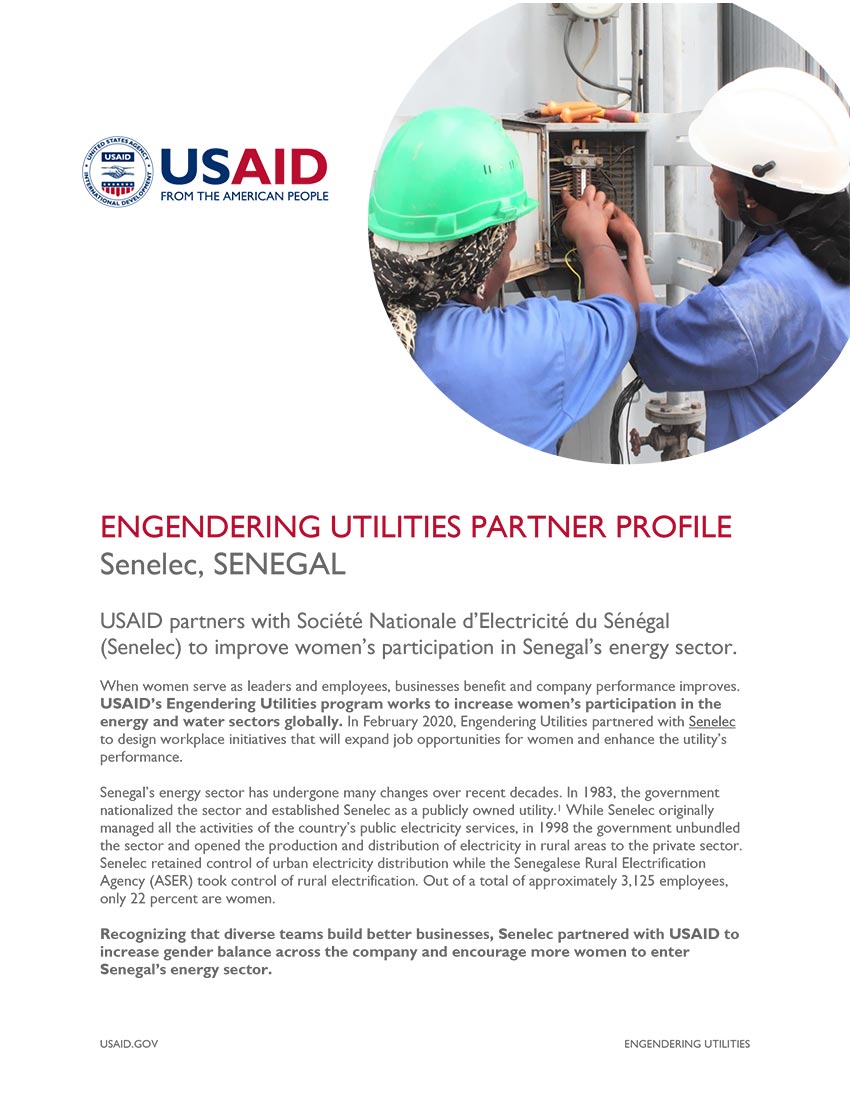- Energy Home
- How We Work
- Programs & Initiatives
- Smart Utilities
- Asia EDGE
- Auction Design Support to Colombia
- Energy Auctions for Kazakhstan’s Green Economy
- Energy Efficiency for Development
- Engendering Utilities
- About
- Business Case
- Approach
- Partners
- OSHEE, Albania
- SONABEL, Burkina Faso
- EDESUR, Dominican Republic
- DELSUR, El Salvador
- EEU, Ethiopia
- Energo-Pro, Georgia
- GRIDCo, Ghana
- BRPL, India
- TPDDL, India
- EDCO, Jordan
- IDECO, Jordan
- Miyahuna, Jordan
- KenGen, Kenya
- Kenya Power
- KOSTT, Kosovo
- LEC, Lesotho
- LEC, Liberia
- EGENCO, Malawi
- EDM, Mozambique
- EKEDC, Nigeria
- IBEDC, Nigeria
- ISWSC, Nigeria
- EVN, North Macedonia
- LASURECO, Philippines
- ZCWD, Philippines
- REG, Rwanda
- OFOR, Senegal
- Senelec, Senegal
- EVN, Vietnam
- Resources
- Stories
- Institutional Framework for Auctions in Mexico
- Powering Agriculture
- The USAID-NREL Partnership
- Scaling Up Renewable Energy
- EmPOWERing Women and Girls
- Competitive Energy Procurement
- Toolkits
- Monitoring & Evaluation
- Resources
- Stories
Speeches Shim
Engendering Utilities Partner Profile
Senelec is a publicly owned electric utility serving Senegal’s urban centers. The utility has 3,125 employees of which 22 percent are women.
Access to electricity in Senegal is slightly higher than in other sub-Saharan African countries, and over 90 percent of urban and 35 percent of rural populations have access to electricity. The country’s demand for electricity consistently outpaces its supply, and Senegal imports significant amounts of diesel and gas to power the country. The government of Senegal has set energy targets that include increasing production of oil to 100,000 barrels per day by 2022, increasing hydropower capacity to 200 GWh, and achieving universal access to electricity by 2025. The country’s Le Plan Sénégal Emergent 2023 outlines goals for universal electricity access and achieving middle-income status by 2035. Senegal has significant potential to develop solar and wind power—as well as the opportunity to develop its offshore natural gas resources. Engendering Utilities’ work with Senelec will ensure women can capitalize on increased investment in Senegal’s energy sector as the industry and labor force expands.
A complex web of contributing factors prevents women in Senegal from joining the formal workforce, particularly the male-dominated energy sector. Education in Senegal is expensive, and poor families often choose to keep boys in school while girls stay home to support household chores. Only 14 percent of girls complete secondary school compared to 26 percent of boys, and only nine percent of girls enroll in tertiary level programs. Within tertiary level programs, less than 30 percent of girls choose to study science or technology related fields. Engendering Utilities is supporting OFOR to consider and respond to factors that reduce women’s workforce participation by building inclusive policies and practices that benefit women, men, and businesses in the energy sector.
USAID is supporting Senelec by providing change management coaching and leadership training, conducting a baseline assessment to identify gaps and opportunities for gender equality, and developing a strategic plan that will facilitate OFOR’s gender equality goals. These strategies will support Senelec in its goal of achieving gender equality in its workforce, in line with national gender strategies that aim to achieve parity in leadership and governance of Senegalese public agencies.
Organizational readiness for change is in place at Senelec, and senior leadership has expressed commitment to:
- Formulate and adopt a gender strategy for the utility.
- Devise recruitment strategies to increase the number of women in technical positions.
- Promote the interest of girls and young women to pursue STEM studies to increase the number of qualified female candidates.


Comment
Make a general inquiry or suggest an improvement.